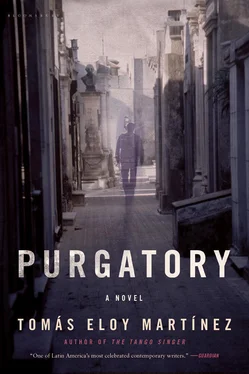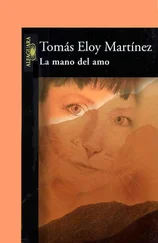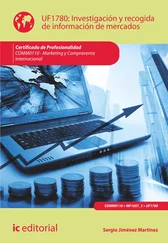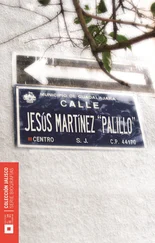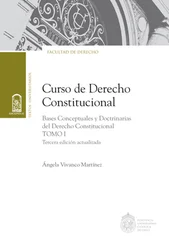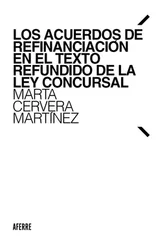She was in complete denial. She had to know about the atrocities her father was alleged to have committed when the dictatorship began to fall apart after the Malvinas War. It was then that the dam burst and the horrors of the past were brought to light: the prisoners who had been tortured, blinded, tossed into rivers or into mass graves; the newborn babies kidnapped, the rapes, the struggle to the death against enemies that did not exist. Dupuy was in each and every circle of that hell: he helped make them possible, gave them his blessing, told Jimmy Carter’s envoys that they were fictions dreamed up by subversives. In the final editorial he wrote for La República , he announced that the magazine was to cease publication because these days people would rather listen to the radio or watch television than read anything. He was a man of words, he said, and he did not care whether his speeches were printed or spoken so long as he had free speech. He admitted that, in the past, he had been guilty of serious sins of omission (he still talked in terms of sins), a fault, he said, he shared with millions of Argentinians. He apologised for paying more attention to the peso’s flotation against the dollar than to the bodies floating in the Río de la Plata. ‘I am responsible for those mistakes, as are thousands of my compatriots.’ The editorial concluded with a sentence that was a model of abject cynicism: ‘The dictatorship that we, the Argentinian people, endured was more criminal, more corrupt than any that has come before. It kept us in ignorance of the atrocities committed even as it allowed itself free rein to commit them. Thanks to God’s great wisdom, the nightmare is finally coming to an end.’
He agreed to television interviews in which he sidestepped difficult questions and, now, stripped of his fascist conviction, extolled the virtues of democracy and tolerance, pronounced himself a Christian who was prepared to discuss even those ideas and beliefs he found distasteful, without explaining what these might be. Though he took great pains to upset no one, some of his actions were brought up during the trials. He was spared punishment, but not rejection. The director of an orphanage for girls declared that the doctor used to visit the inmates from time to time, choose one of the prettiest and take her for a drive in his car. None of them ever returned. They were young girls, little more than teenagers, learning to sew, to cook, to do accounts. They had no families to claim them, they lived in the orphanage isolated from all contact with the outside world. I read the woman’s statement in the Diario del Juicio , and for days afterwards the horror of it made me feel physically sick, it made me feel ashamed to think what we had silently allowed to happen, to think of the depths to which the human race could sink. When I told my neighbour Ziva Galili about it, she said that Lavrentiy Beria, one of Stalin’s butchers, had been accused of similar atrocities. Just before the Second World War, he had been the head of NKVD, the Soviet Union’s internal security police. At the end of the day, he and his henchmen would go hunting for girls on the streets of Moscow, of Kokoschkino, of Noginsk, or whatever far-flung suburb his duties as a spy took him to. When he found a girl he liked, he ordered the car to follow her discreetly without attracting attention. Suddenly, he would attack. One of his henchmen would block the girl’s path, throwing open the car door, while another bundled her inside where Beria would examine her more closely. If the examination proved satisfactory, he would take the girl to a secret house, gag her and tie her up. After the rape, the least submissive girls were thrown into the Moskva River, the others were sent to the army brothels in Siberia. I had read fragments of this chilling story in a book by Donald Rayfield 16about Stalin’s ‘hangmen’ and their abuses. In the book, I had seen a disturbing photo of Beria when he was about forty in which he looked very like Dr Dupuy: the same broad forehead, the same lascivious mouth, a nose like the beak of a bird of prey. Democratic openness made it possible for a number of newspapers to mention other sordid stories about Dupuy, but they were quickly snuffed out by the avalanche of civil and criminal suits he filed to defend himself. Many of those who could have denounced him had been his accomplices and even the teachers at the orphanage were not prepared to identify him as the man who took away the girls.
In late 1977, Dupuy had been the adviser to whom the comandantes most often turned, the only one they were prepared to accept as a moderator in their power struggles. One November night he was summoned to the presidential palace. It was seven months before the start of the World Cup and everything had already been completed: the stadiums, the hotels for visiting journalists, the motorways, the TV station which would broadcast the games in colour. Dupuy assumed he had been summoned to mediate in another of the endless wranglings for power. He would be blunt, tell them to sort it out themselves. Or perhaps they would ask him to discreetly get rid of the annoying gaggle of women 17who gathered at the Pirámide de Mayo every Thursday afternoon right under the their noses, demanding the return of sons who were lost or dead. Whatever the mission entrusted to him by the comandantes , he would know how best to deal with it, which would make all three of them happy.
By the time he arrived for the meeting, it was almost midnight. The corridors of the presidential palace were deserted: Dupuy had negotiated these hallways many times and knew he had to move carefully. Every twenty or thirty metres, someone would step out of the shadows and demand that he produce his papers. As he walked, the air became hotter and hotter. He leaned for a moment on the balustrade of the gallery and looked down at the palm trees in the courtyard. The night swelled, the darkness swelled (there is no other way to explain the slow inflammation of reality), and pollen stained the floor tiles a cloying yellow. An aide-de-camp came to meet him and walked with him to the dining room where the comandantes were finishing their meal. They seemed nervous, upset. The table was littered with press clippings from foreign papers, cartoons, stark headlines about the secret concentration camps, the torture, the numbers of the disappeared. One of the cartoons depicted the Eel with a little moustache like Hitler’s and the same lock of hair falling across his forehead. The artist had taken pains to make sure the hair looked shiny and stiff with hair cream. Dupuy had the impression that the commander-in-chief of the navy was amused by this display of rubbish. He was a strapping, muscular, arrogant man, the opposite of the Eel. He apologised to Dupuy for summoning him at such a late hour and asked him to take a seat.
‘We don’t want to take up too much of your time. I’m sure you’ve realised why we asked you to come. We need your help, your imagination.’
‘A vicious campaign has been unleashed against us,’ the Eel interjected. ‘It needs to be stopped as soon as possible. In a few months, the whole country will be on display for all the world to see. Our every move is going to be examined under a microscope.’
‘I assume you’ve read my latest editorial in La República refuting this sleazy campaign.’
‘ “Rights and Humans”? It was a model of intelligence, Doctor, as your writing always is,’ said the admiral. ‘However, what you write unfortunately only influences opinion in this country. And the country needs no convincing. They realise that when they attack the government, they attack the nation. What we cannot control are the lies spread abroad—’
‘The vicious campaign against Argentina,’ interrupted the Eel. ‘You’ve seen the cartoons attempting to ridicule me.’
Читать дальше
